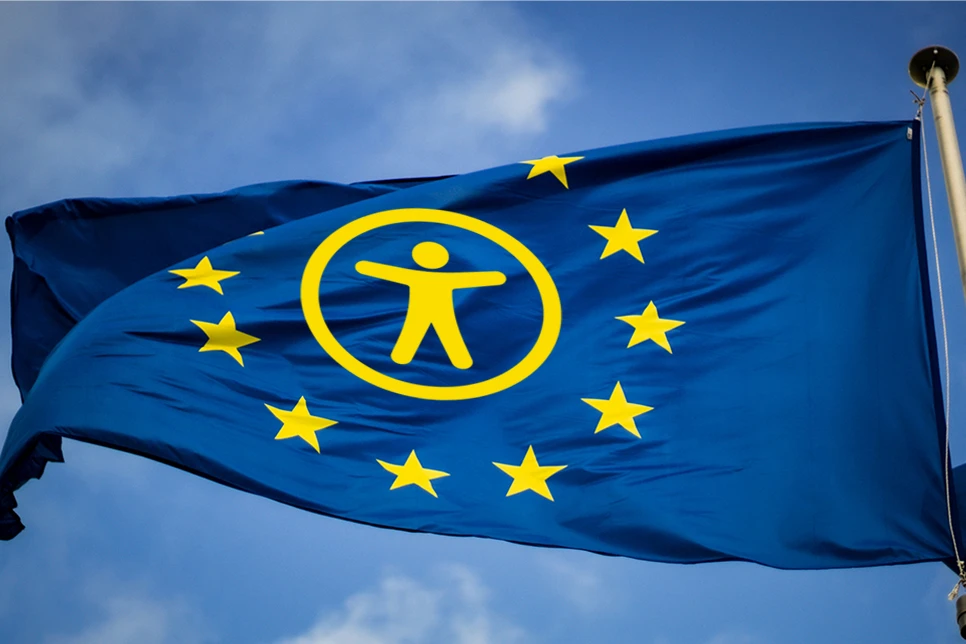KnowledgeWorks Global Ltd. (KGL) hosted a well-attended webinar on the impact of upcoming accessibility mandates for digital publishing. The session titled, Preparing for the European Accessibility Act – Essential Guidance for Publishers, brought together industry experts to explore the European Accessibility Act (EAA), its implications, and practical strategies for compliance.
For those who missed it, click below to stream the webinar recording:
The panelists, Michael Johnson from Benetech and James Yanchak from Taylor & Francis, answered a variety of questions posed by the moderator, KGL’s Tom Beyer, and the audience. Below, we’ve compiled a selection of the most frequently asked questions (FAQs), grouped by topic, for easy reference.
Please Note: The information provided in this article is for general informational purposes only and is not intended as legal advice. While KGL strives to provide accurate and up-to-date guidance, publishers are encouraged to consult with legal professionals or compliance experts to address specific legal obligations under the EAA.
European Accessibility Act (EAA) Overview
Q: What is the definition of “accessibility” under the EAA?
Accessibility refers to the design of environments, products, and services that can be used by all people, including those with disabilities. In the context of digital content and technology, accessibility ensures that websites, applications, and digital documents are usable by individuals with a wide range of abilities. The Web Content Accessibility Guidelines (WCAG) provide a comprehensive framework for making digital content accessible, based on four core accessibility principles: Perceivability, Operability, Understandability, and Robustness.
Q: Are American-based publishers subject to fines for EAA violations if they sell in the EU?
Yes, publishers selling products or services in the EU must comply with the EAA, regardless of their location. Non-compliance can result in fines enforced by EU member states.
Q: Is there a grace period for getting backlist eBooks up to EAA standards? If we cannot make older eBooks compliant in time for the deadline, would they need to be removed from sale?
As of now, there does not appear to be a blanket grace period for backlist eBooks under the EAA. Any eBooks sold in the EU (including backlist titles) after June 2025 must comply with EAA standards. Publishers unable to make older titles compliant may need to temporarily or permanently remove them from sale in the EU to avoid penalties.
The EAA language often cited referring to a five-year grace period mentions services, but it is not yet determined if content can be classified as a service. An illustration of the different interpretations of the temporary exemption can be seen in a Scholarly Kitchen blog article and ensuing discussion from earlier in 2024. Although any future litigation will certainly further inform how to leverage the “disproportionate burden” clause, it is not unreasonable to think that being forced to convert the entirety of a publisher’s archive could be deemed a disproportionate burden, given the depth of archives in some cases going back for centuries.
Q: Are niche publishers with annual sales under $1 million USD required to comply with the EAA?
The EAA includes provisions that exempt small businesses. Companies with fewer than 10 employees or annual revenues below €2 million (approximately US$2.2 million) are generally not required to comply.
That said, even exempt publishers are encouraged to adopt accessibility practices to enhance their brand reputation, broaden audiences, and to promote inclusivity, making your content more impactful and marketable.
Compliance for Digital and Print Content
Q: If a publisher provides the same content in PDF, EPUB, and/or full-text HTML, must all formats be made accessible or is it sufficient to focus on one?
From speaking to our customers and industry experts, our understanding is that the provision of at least one compliant format for any content (such as accessible full-text HTML, ePub, or PDF), is sufficient for the purposes of EAA compliance. Publishers are required to include an accessibility statement on their website specifying which formats are accessible.
Q: Does the EAA apply to self-publishing platforms like Amazon?
Yes, self-published books sold in the EU, including through Kindle Direct Publishing (KDP), must comply with EAA requirements.
Q: Are Open Access books required to be accessible under the EAA?
Yes, the EAA applies to all digital content, including Open Access books, whether sold for profit or offered for free.
Q: How does the EAA affect Print-On-Demand (POD) books?
POD books are affected if their digital version is sold or distributed in the EU. The digital version must comply with EAA standards.
Q: Does the EAA impact eLearning platforms and EdTech companies?
Yes, the EAA directly impacts eLearning platforms and EdTech companies. The EAA requires all digital products and services, including eLearning platforms, be accessible to individuals with various abilities. Compliance is essential for meeting legal obligations and fostering inclusivity, ensuring resources are accessible to a wider audience, and promoting equitable learning opportunities for all.
Q: Does the responsibility lie with publishers to block the purchase of non-accessible products in the EU, rather than with libraries or professors using older textbooks?
Yes, under the EAA, publishers and distributors bear the responsibility for ensuring compliance. If any online bookstore sells non-accessible books to EU customers, you could be held accountable for non-compliance. To mitigate this, you may need to ensure all products meet EAA standards or restrict purchases from the EU for non-compliant items.
Websites, Platforms, and Metadata
Q: Do websites need to comply with the EAA?
Yes, websites, mobile apps, and e-commerce platforms offering products or services in the EU must comply with the EAA to ensure accessibility for all users.
Q: Does the EAA affect submission and production systems that authors might interact with?
The EAA applies to web content, and that includes public-facing user interface of publishing systems. KGL is actively working on making all our platforms compliant.
Q: Who is responsible for adding accessibility codes to ONIX metadata?
The responsibility for adding accessibility codes to ONIX metadata primarily falls on the publisher. ONIX metadata ensures that information regarding a product’s accessibility features is communicated throughout the supply chain. Online bookstores and other intermediaries use this metadata to inform customers about accessibility features of the product.
Addressing Specific Content Types
Q: Do accessibility requirements apply to conference proceedings or journals?
Conference proceedings published as digital documents or e-books must comply with the EAA, including providing accessible formats like tagged PDFs or structured XML.
With regard to journals, again without providing legal advice, it is our understanding and the understanding of some of our larger publishers that journals are not currently part of the focus of the EAA. However, the direction of travel, including the April 2026 enforcement of Title II of the Americans with Disabilities Act, suggests that publishers of any content type consider accessibility as core to their production process and delivery formats.
Q: What steps are needed for video accessibility?
Videos must include captions, transcripts, and audio descriptions to meet accessibility standards.
Q: How should complex images be handled for accessibility?
In addition to short alt text descriptions, long descriptions should be provided for images that convey substantial or complex information. Color contrast and font size recommendations provided in WCAG should be adhered to as well.
Practical Considerations and Vendor Support
Q: Is it worthwhile for publishers to pursue Benetech Global Certified Accessible (GCA) certification?
Yes, achieving Benetech GCA certification demonstrates a commitment to accessibility and ensures compliance with recognized standards. KGL is a GCA-certified vendor and can provide guidance on certification.
Q: How can small publishers or journals meet the EAA requirements?
KGL offers tailored accessibility solutions for publishers of all sizes, helping them navigate the requirements and implement compliance measures effectively.
Q: What are the cost implications of making books accessible?
Costs depend on content complexity and required features. Integrating accessibility early in the process (especially at authoring) significantly reduces costs. Please contact KGL for an estimate.
Final Thoughts
Accessibility is not just a regulatory requirement—it’s a commitment to inclusivity and broader audience engagement. With the June 2025 EAA compliance deadline approaching, proactive planning is critical.
KnowledgeWorks Global Ltd. (KGL), a Benetech Global Certified Accessible conversion vendor, is a champion of digital equality. For further resources and guidance on accessibility standards and compliance for journals, books, digital media, websites, eLearning, and more, download our report, Accessibility for Publishers, visit kwglobal.com/accessibility or email us at accessibility@kwglobal.com.





